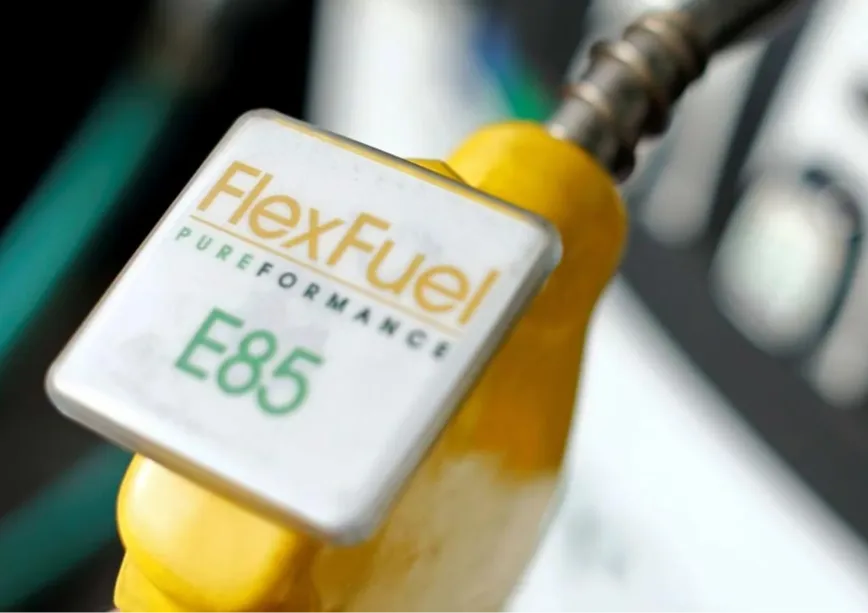
Imagine a future where vehicles not only navigate roads but also traverse a sustainable, eco-conscious route. In India, this vision is taking shape through a promising alternative—flex fuels. As the nation grapples with mobility demands and environmental obligations, flex fuels emerge as a compelling contender against the backdrop of the ongoing EV fervour.
India's stride towards ethanol blending via the Ethanol Blended Petrol programme stands as a testament to its commitment to greener energy. Surpassing the E10 target, the country aims for a 20 percent ethanol blend by 2025-26, signaling a transformative shift in fuel consumption patterns.
Drawing inspiration from Brazil, the focus has shifted to flex-fuel vehicles (FFVs) as potential catalysts for India's sustainable future. These vehicles can efficiently run on an ethanol-petrol blend of up to 85 percent, referred to as E85 fuel, demanding a notably sophisticated engineering approach for FFVs. However, embracing FFVs requires adjusting the fuel plumbing and various components in an internal combustion engine, encompassing essential parts like pistons and valves.
Advocates like Pramod Chaudhari underline the practical need for flex-fuel cars over EVs, especially if EVs' energy sourcing lacks complete reliance on renewables.
Drawing inspiration from Brazil, the focus has shifted to flex-fuel vehicles (FFVs) as potential catalysts for India's sustainable future.
Automakers are echoing this sentiment. Maruti Suzuki and others showcase flex-fuel models, though acknowledging the necessity of infrastructure development for their widespread acceptance. Maruti Suzuki, an advocate of ethanol-blended vehicles, showcased its WagonR flex fuel prototype at the 2023 Auto Expo, which can blend ethanol in the range of 25-80 percent, expected to be launched in 2025.
Recent announcements by Nitin Gadkari, Minister of Road Transport and Highways of India, unveiling plans for vehicles solely powered by ethanol, represent a significant leap. Major manufacturers committing to ethanol-powered scooters and cars, combined with technological strides, propel the flex-fuel narrative forward. TVS Motor, for instance, is expected to launch the first flex-fuel two-wheeler in India by 2024.
Flex Fuel Technology offers unparalleled flexibility, tapping into renewable energy sources and reducing emissions. While the adaptability empowers drivers to select fuel based on availability, cost, and environmental factors, ethanol, sourced from renewable reservoirs, such as corn or sugarcane, remarkably reduces a vehicle's carbon footprint, resulting in fewer greenhouse gas emissions during combustion. Specifically, the E20 blend impressively cuts carbon monoxide emissions by almost 50 percent in two-wheelers and achieves a commendable 30-percent reduction in four-wheelers compared to E0 as shown in the table below.
| Emissions |
Gasoline |
Two-wheelers |
Four-wheelers |
|
|
E10* |
E20* |
E10* |
E20* |
| Carbon Monoxide |
Baseline |
20% lower |
50% lower |
20% lower |
30% lower |
| Hydrocarbons |
Baseline |
20% lower |
20% lower |
20% lower |
20% lower |
| Oxides of nitrogen |
Baseline |
No significant trend |
10% higher |
No significant trend |
same |
| *E10 project was carried out in 2009-10, E20 project in 2014-15. Hence, the test vehicles were not the same. However, the emission trend is similar. |
Source: Niti Aayog
Possible obstacles
However, FFVs bring forth a range of hurdles as well. Engine wear, a significant issue, is exacerbated by the ethanol component, causing heightened stress and corrosion, posing considerable challenges for engineers. Furthermore, varying fuel economy, particularly with higher ethanol blends like E85, leads to decreased overall efficiency.
Moreover, infrastructure limitations stand as a major obstacle, demanding substantial investment for accommodating the shift, with an annual requirement of over 1,000 crore litres of ethanol for the E20 programme. Additionally, transitioning to flex-fuel vehicles entails increased costs estimated at INR 25,000 for cars and INR 12,000 for two-wheelers, attributed to technological changes and material re-engineering compared to regular petrol vehicles.
India faces the conundrum of an aggressive EV push while simultaneously grappling with challenges in promoting flex fuels. This necessitates a diversified strategy, considering the limitations of EVs and the vast potential of flex-fuel technology.
Infrastructure limitations stand as a major obstacle, demanding substantial investment for accommodating the shift, with an annual requirement of over 1,000 crore litres of ethanol for the E20 programme.
Addressing these challenges requires concerted efforts. Building capacity, enhancing stakeholder engagement, and driving consumer awareness are paramount. Aligning flex fuels with India's agricultural economy presents a compelling case, requiring governmental support for widespread adoption.
The Global Biofuel Alliance (GBA) emerges as a pivotal ally in this journey, offering a wealth of knowledge and experience. The GBA, formed during the recent G20 Summit in India, aims to support the development and deployment of sustainable biofuels. This alliance is aimed to facilitate joint ventures between Indian companies and entities from other countries, including Brazil, a world leader in the biofuel economy, allowing for the sharing of technology and policy lessons.
Drawing inspiration from Brazil’s successful ethanol programme, India can learn valuable lessons in infrastructure development, stakeholder engagement, and policy frameworks that incentivise the adoption of flex fuels. By studying Brazil’s methods, India can enhance its own ethanol production and blending processes, leading to greater energy independence and sustainability.
The GBA, formed during the recent G20 Summit in India, aims to support the development and deployment of sustainable biofuels.
The road ahead demands a multi-faceted approach. Despite hurdles, India's embrace of flex fuels signifies a monumental shift towards responsible fuel consumption. Combining various technologies and fuel types is the key to achieving mobility and climate objectives while ensuring sustainability.
In this transformative journey, continued collaboration among stakeholders remains imperative. As India forges ahead, integrating flex fuels into its cleaner and greener mobility narrative becomes essential, heralding a more sustainable future.
Thus, flex fuels aren't merely an option; they are a transformative force driving India's sustainable mobility revolution.
Manish Vaid is a Junior Fellow at the Observer Research Foundation
Disclaimer – Views expressed are those of the author.
The views expressed above belong to the author(s). ORF research and analyses now available on Telegram! Click here to access our curated content — blogs, longforms and interviews.




 PREV
PREV


